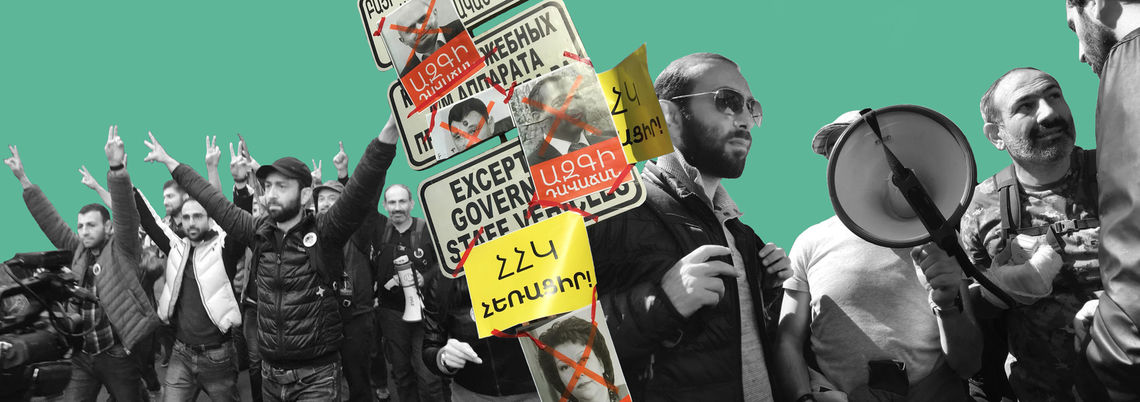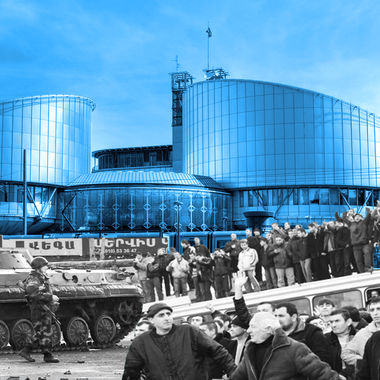Sun Sep 30 2018 · 12 min read
Ararat Mirzoyan on Snap Elections, Electoral Code Reforms and Transitional Justice

By Maria Titizian

A wave of countrywide protests and unprecedented acts of civil disobedience earlier this year that came to be known as the Velvet Revolution, not only ushered in a new government, but a new, albeit uncertain political era in Armenia. Led by opposition leader Nikol Pashinyan, the Velvet Revolution upended the ruling Republican Party of Armenia’s two-decade-long dominance of the country’s political landscape. After days of massive protests and immense public pressure, Prime Minister Serzh Sargsyan resigned on April 23 and two weeks later, on May 8, the National Assembly elected Nikol Pashinyan as Armenia’s new prime minister.
One of the promises made by the newly-elected Premier was to hold pre-term elections following amendments to the Electoral Code to ensure elections would no longer be marred by vote rigging or use of administrative resources and would ensure a fair race. That promise was at the heart of the government’s 2018 program that was approved by the National Assembly. However, in the absence of a majority in parliament and a shaky “agreement” with two other political forces who form the government - the Prosperous Armenia Party (PAP) and the Armenian Revolutionary Federation (ARF) whose votes allowed Pashinyan to come to power - this is not going to be an easy endeavor. Faced with this hurdle, the government is maneuvering to find a mechanism within the framework of the Constitution and existing laws to hold snap parliamentary elections. At the same time, revelations of corruption cases by former high-ranking state officials rattled the country. While it was “common knowledge” that such corruption existed, bearing witness to the depth and breadth of it, led to outrage and riveting news coverage. These revelations, coupled with the unhealed trauma of the March 1, 2008 crackdown by security forces against peaceful demonstrators that left 10 people dead and for which no one was held accountable, has prompted the new government to call for transitional justice to be implemented.
First Deputy Prime Minister Ararat Mirzoyan sat down with EVN Report to talk about the challenges facing the new government and their plans for overcoming them.
Snap Parliamentary Elections
Under current constitutional arrangements, there are two scenarios that would trigger pre-term elections. The first is if parliament votes down the government’s program (government resigns and a new vote for prime minister is called) and the second is if a sitting prime minister resigns. After a resignation, parliament has two attempts to elect a new premier and if unsuccessful, parliament is dissolved and snap elections are held. Both of these seem to be untenable at the moment. Pashinyan’s government’s program was approved in June and if he were to resign today, it’s not clear if the other parliamentary factions would allow the vote for a new premier to fail, hence triggering new elections. On the other hand, Pashinyan has no guarantees that parliament will not elect someone else as prime minister although this is unlikely due to his popularity and the very real possibility that this could prompt fresh protests. The Yelk Bloc (composed of Pashinyan’s Civil Contract Party, Bright Armenia and Republic parties) only has seven seats, the RPA is in no rush to support any initiative of the government and relations with the other parliamentary factions are cool to say the least, even though both PAP and ARF hold ministerial posts.
“The Constitution does not allow for the self-dissolution of parliament. This, however, contradicts one of its fundamental irrevocable provisions, that is, authority belongs to the people, therefore the people, in theory can also call for the dissolution of parliament, the body which they voted for by deciding now that this body no longer represents them.”
First Deputy Prime Minister Ararat Mirzoyan said that the parliament, as a representative body, today, no longer represents the people. Whether the RPA, (although they no longer hold majority seats, the party does have numerical superiority in the legislature), could stall the process of going to pre-term elections, Mirzoyan noted that the former ruling party must seriously evaluate the current situation in the country. “They hardly represent anybody and their continued existence and the continued existence of this parliament is negatively affecting Armenia’s future development,” he said. “Among other things, it is creating a constitutional crisis.” As Mirzoyan clarified, there is an executive that is not able to work constructively with a parliament that no longer represents the will of the people. In these conditions, the running of the state must continue and yet this uncertainty is hampering both branches from working productively. “There are investment interests that are currently in a holding pattern and many other issues,” Mirzoyan said adding that security issues are also a serious concern taking into consideration Armenia’s geopolitical situation. “The only solution to these issues is for parliament to be dissolved,” he said.
Faced with the possibility of pushback from the other parliamentary powers, the current administration is considering making amendments to the Constitution that would give them other options for the dissolution of parliament. This, however, would require a referendum that would need parliament’s approval. “The Constitution does not allow for the self-dissolution of parliament,” Mirzoyan said. “This, however, contradicts one of its fundamental irrevocable provisions, that is, authority belongs to the people, therefore the people, in theory can also call for the dissolution of parliament, the body which they voted for by deciding now that this body no longer represents them.”
According to Mirzoyan, consultations have been held with leading legislative and constitutional experts. “They have all concurred that this is a situation that demands a swift legal and political solution and constitutional amendments are absolutely acceptable,” he noted. It is clear, he continued that the sooner a resolution is found to the situation, the sooner everyone will benefit, most of all the country. However, continuously making amendments to the country’s Constitution to suit the administration of the day could set unhealthy precedents. When Serzh Sargsyan and the RPA proposed and were later successful in pushing through a package of constitutional amendments that switched the country’s governance from a semi-presidential to a parliamentary one in a 2015 constitutional referendum, many in the country felt it was a power grab to ensure a third term for Sargsyan. “We shouldn’t view this as a situation where the Constitution is being changed to suit a particular regime,” Mirzoyan stressed. “This is not that situation, this is naturally not the case.”
“We had free, fair [municipal] elections which I believe no one can cast a shadow of a doubt on - whether they gave it for Pashinyan or the team...in the larger picture, they gave their vote of confidence for the revolution. And yes, to the leader of the revolution.”
The Venice Commission, the Council of Europe’s advisory body on constitutional matters has said that it is ready to support Armenia in these changes. Mirzoyan said that the Commission is prepared to speed up the process in examining the documents that will be submitted by the Armenian government. He hopes that they will submit the relevant documents for review within the month.
Following the results of the Yerevan Municipal Elections that took place on September 23, that saw a landslide victory for the My Step Alliance, it seems as if the administration’s stance is more assertive. Securing over 80 percent of the vote, the Civil Contract Party along with the Araqelutyun party that formed the My Step Alliance basically obliterated all opposition. Coming in a distant second was PAP with 6.96 percent of the vote and the Luys Alliance (composed of the Bright Armenia and Republic Parties) came third with 4.99 percent. With this convincing mandate, it appears that this administration is now telling its political opponents that they have no choice but to negotiate with them. “We have said from the beginning, and it was included in the government program, that snap elections would take place and this was approved by parliament, regardless of how individual parliamentarians voted; the National Assembly as an institution approved it,” Mirzoyan explained. “The elections [municipal] came to prove that the parliament is not representative body; it does not represent the political persuasions nor is it the preference for many people in the country.”
Reflecting on opinions that the victory of the My Step Alliance was conditioned by Pashinyan’s continuing popularity and had nothing to do with municipal issues, Mirzoyan said, “There is a team that led a revolution, and a people who realized a revolution; then there is the executive, a new authority, that is led by Nikol Pashinyan and the people who have shown an almost total support for him.” In an institutional sense, it doesn’t change anything Mirzoyan noted. “The executive branch has the support of the people while the legislature, which should represent the people, doesn’t barely represent anyone.” He says that there are no choices to be made - the National Assembly must be dissolved and he believes that most of the factions in parliament understand this.
Future of the Yelk Bloc
While there’s no question that this administration has been successful in mobilizing the support of the masses and leveraging this support to advance its political goals, it has not been entirely successful at putting together a functioning coalition. While the PAP and ARF are part of the executive, it appears their continued cooperation is not out of an alignment of political goals; it’s because they don’t have many other cards in their hands. Could it be that Pashinyan’s popularity is being utilized against political any opposition? “People have gone with their free will and have voted by 80 percent for our party,” Mirzoyan responded. “We had free, fair [municipal] elections which I believe no one can cast a shadow of a doubt on - whether they gave it for Pashinyan or the team...in the larger picture, they gave their vote of confidence for the revolution. And yes, to the leader of the revolution.”
“I can't say for sure what happens with parliamentary elections; politics requires a thousand different ways to negotiate. Today, the Yelk Bloc is in no way operational.”
However, Mirzoyan is very clear that this is not a coalition government. “This is a ‘government of agreement’ that was formed taking into consideration the very specific conditions created in the country and to organize the transition period smoothly and in an atmosphere of agreement,” he noted. Indeed, when the country was tumbling into political turmoil after the resignation of Prime Minister Sargsyan and parliament failing to elect a new premier on May 1, agreements were made with these powers, including also the RPA who agreed to provide enough votes for Pashinyan to come to office during the final vote for the prime minister on May 8.
The Deputy Premier insisted that the people’s express support for the revolution should be a signal to everyone, including the RPA who, for their part, have been sending clear signals of their own that they are not willing to easily concede to snap elections.
As for the Yelk Bloc, Mirzoyan said that the political alliance will exist as long as this current parliament continues to exist. “Under other conditions, we can say that the Yelk format no longer exists, because as you saw during the municipal elections, the parties composing the Yelk bloc participated under two different formats - one party, the Civil Contract Party, participated as the My Step Alliance, and the other two parties as the Luys Alliance,” he said. “What happens with parliamentary elections, I can’t say for sure, politics requires a thousand different ways to negotiate. Today, the Yelk Alliance is in no way operational.”
Electoral Code Reform
Following up with his promise to amend the Electoral Code, on June 19, Nikol Pashinyan appointed the Prime Minister’s Special Commission on Electoral Reform. On the initiative of the Speaker of Parliament and member of the RPA faction Ara Babloyan, the following day, the four factions represented in parliament issued a joint statement about the formation of a Parliamentary Working Group on Electoral Reform. According to Mirzoyan, the two commissions have been working intensively on a number of amendments. Some of the fundamental changes on the table include lowering the threshold for parties and alliances, excluding the controversial territorial rating system on the closed-list system for parliamentary lists, raising the quota for women’s representation, among others that will secure that elections are conducted in a free and transparent manner. Mirzoyan said that the last session of the commissions have taken place and a bill is currently being drafted and will be presented for public discussion before it is tabled in parliament.
According to law, amendments to the Electoral Code require a three-fifths (60 percent) majority of members of the National Assembly. If the Republican Party MPs can maintain a united front, they would hold an effective veto over any changes as they represent more than 40 percent of the seats in parliament.
Mirzoyan noted that the Commission set up by parliament to look at electoral reforms has presented their ideas and “we have accepted many of those.”
on electoral amandments

Armenia's New Electoral Code
Part I
Open vs. Closed Party Lists and Other Considerations
Part II
Thresholds, Alliances, and Coalition Government
Part III
Quotas For Women and Ethnic Minorities
Transitional Justice
During a massive rally in Yerevan marking the 100 days of his administration, Nikol Pashinyan announced that his government was considering implementing transitional justice to address a number of legal-judicial matters confronting Armenian society. This announcement led to a flurry of concerns, analyses, and commentary by many in Armenia. It quickly became clear that the concept was not well understood.
Ararat Mirzoyan said many countries, including European ones, have utilized transitional justice during times of transition from a quasi-democratic to a democratic system. “Often, there are issues left over from the old regime regarding the violation of human rights,” he said. “For example, overthrowing constitutional order, rigged elections, financial crimes and corruption which many people have been guilty of.” He noted that sometimes, thousands if not tens of thousands of people can be guilty of crimes which the justice system is not capable of handling in terms of sheer volume. “If for example in one case when there are thousands of people guilty of a particular crime, let’s say principals and teachers who have been involved in electoral fraud, what should happen? Should all those people be sent to prison? Of course not,” he explained. The deputy premier said that the most critical mission of transitional justice is to register these crimes, and help society move on; have the guilty parties apologize and then move to reconciliation. “The transitional justice body is often coined truth and reconciliation commissions,” he explained and added that there will certainly be people who will be charged and tried, but they would be those at “the top of the pyramid.” Mirzoyan explained that the purpose of utilizing transitional justice is to clearly demarcate who will be tried and who will be forgiven and made it very clear that the transitional justice body would not replace or supercede but rather support national courts.
on trasitional justice
Vahe Grigoryan on the Events of March 1, a Dysfunctional Judiciary and Transitional Justice
By Maria Titizian
Is it possible to restore and rehabilitate Armenia’s judiciary? Vahe Grigoryan talks about the significance of a landmark judgment by the ECHR relating to the events of March 1, 2008 when security forces cracked down on peaceful protesters during post-election demonstrations leaving ten people dead.
To implement any form of transitional justice, relevant laws must be adopted by parliament. Mirzoyan said that they have been working on drafting a bill which is almost at its final stages. “There must be a law upon which that [transitional justice] body will be formed,” he noted. “We cannot create illegal courts in Armenia; this is something that must be understood by everyone, especially those in parliament who will vote on this bill as they too have to pass through the road of forgiveness and integration. I think they should want to pass this law.”
The Way Forward
Negotiations with other parliamentary factions for dissolving parliament will begin in earnest. “In May, we had an agreement that within a year, snap parliamentary elections would take place,” Mirzoyan noted adding that active negotiations, moving forward, will begin.
Begin they must, but there remains the critical factor of their lack of a majority in parliament. What happens if parliament votes down the amendments to the Electoral Code or refuses to pass a decision to hold a referendum on constitutional amendments? Mirzoyan said that there are other political and legal avenues to explore. “The Armenian people and the Republic of Armenia cannot be held hostage by those in parliament who imagine themselves to be parliamentarians,” he said.
If the worst case scenario was to reveal itself, would Pashinyan and his government consider bringing people back on to the streets? “Always,” said Mirzoyan. “Until all issues are resolved.” Some might argue that a continual revolution could be detrimental for the country taking into consideration security issues. “What do you propose we do? The revolution must be completed. And to all those who say this can lead to insecurity, I would say that they are the ones who are posing a threat to the country.”



